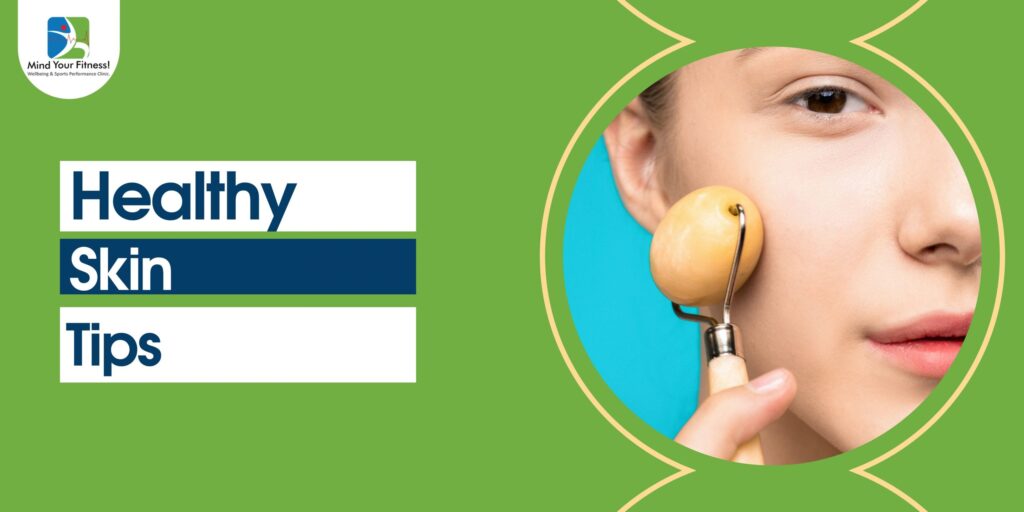
Skin is the largest organ of our body. It constitutes of around 16% of total body weight. Skin serves as a physical barrier to harmful external forces, such as UV radiation, pathogens, and various chemicals. Similar to other organs, our skin also requires special care for optimal function. It is the main part of our external beauty, and therefore in addition to external care it is also necessary to focus on internal care for achieving healthy skin.
FREQUENT CAUSES OF SKIN PROBLEMS
- Sun exposure
- Unhealthy diet
- Smoking/Alcohol
- Hormonal Changes
- Stress
- Chronic illness: diabetes, allergies, autoimmune conditions
Excess carbohydrates can aggravate acne and also glucose can form cross linkages with collagen damaging it (glycation).
SKIN FRIENDLY NUTRIENTS
The basic structure is made of fat and protein and hence needs to be supplied with adequate essential amino acids and fatty acids to maintain integrity.
The following nutrients are essential in maintaining optimal skin health:
- Vitamin A– Aids in maintaining and repairing of skin tissues.
- Vitamin B2– Assists in maintenance of collagen, reduces inflammation, aids in wound healing and promotes moisture.
- Vitamin B6, B9 & B12– Aids in collagen synthesis and is essential for skin cell development and maintenance and also reduces inflammation
- Vitamin C & E– It acts as an antioxidant.
- Vitamin D3– Exhibits photo protective effects, decreases DNA damage, increases cell survival, promotes wound healing and tissue repair.
- Vitamin K– Prevents the calcification of elastin and allows the skin to retain moisture through enhancing skin barrier function.
- Zinc & selenium– Protects the skin from photo damage by reflecting and absorbing UV radiation and provides antioxidant protection.
- Omega 3 fatty acids– reduces inflammation.
- Collagen- Helps in maintaining integrity.
A dietitian can guide you with supplements.
REMEMBER TO STAY HYDRATED!
How often do you hear that drinking lots of water is essential for your overall health? Probably all the time. But, do you know how important hydration is for your skin as well? No matter what your skin type is, a hydrated skin looks more plump, healthy and youthful. Water helps circulation and helps in eliminating waste. Stay away from alcohol.
A Quick tip to check whether you are hydrated/ dehydrated-
- Gently pinch the skin on your arm with two fingers and let the skin go. Check to see if the skin is slow to return to normal, you might be dehydrated.
- Keep an eye on your urine color, if its dark yellow then it indicates dehydration.
EXERCISE
Exercise is beneficial for your overall health. Here’s another reason to keep moving: Exercise is one of the keys to healthy skin. Regular exercise improves the health of the skin by improving blood circulation to the skin surface. This helps to supply essential nutrients to the skin. Working out also tones the skin and thus imparts a healthy glow. The stronger your muscles are, the more support the skin will have. Evidences suggests that exercise can ease stress.
STRESS:
During stressful conditions, the sympathetic nervous system of our body releases stress hormones like cortisol leading to increased oil production in your skin glands, that can further lead to clogged pores and acne breakouts. Stress also impacts the immune system and can cause inflammatory skin conditions leading to rashes, redness, psoriasis.
SLEEP:
SLEEP IS CENTRAL FOR CELL RENEWAL AND REPAIR AND THAT INCLUDES YOUR SKIN. Make sure you get quality sleep.
SUN EXPOSURE
Brief and direct sun exposure in the morning might be good for your vitamin D levels but avoid harsh exposure during noon. Use a sunscreen and reapply as needed.
HYGIENE
Dry your skin thoroughly after you shower. Avoid synthetic fabrics for longer durations if you tend to sweat a lot. Make sure you bathe immediately after you use the gym/pool.
Check with a dermat for products/procedures that suit your skin if you are sensitive or have a skin condition.
Authored by Janvi Dhanak, Clinical Nutritionist, Mind Your Fitness!





